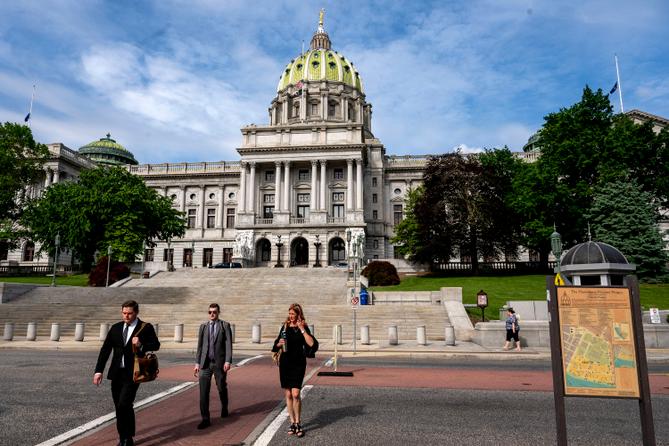Spotlight PA is an independent, nonpartisan newsroom powered by The Philadelphia Inquirer in partnership with PennLive/The Patriot-News, TribLIVE/Pittsburgh Tribune-Review, and WITF Public Media. Sign up for our free newsletters.
HARRISBURG — It’s never a good sign when official legislative business becomes a punch line.
In 2021, 19% of laws passed by Pennsylvania’s Republican-controlled General Assembly renamed a bridge or road, according to a Pennsylvania Capital-Star analysis.
The statistic became a joke among lobbyists. At least one lawmaker cited it during a floor debate.
But it also exemplified the frosty relationship between Democratic Gov. Tom Wolf and the Republican leaders who decided which bills reached his desk.
GOP lawmakers were still smarting from Wolf’s use of executive actions during the first year of the COVID-19 pandemic. In response, Republicans, with support from a handful of Democrats, sent voters two constitutional amendments that curtailed the governor’s powers and gave the legislature more say in disaster management.
But the trend reversed in Wolf’s final year in office. The governor and Republican leaders were able to agree to a major budget package that spent billions in federal stimulus money, and passed the most laws in six years. Just 3% of successful bills during this last year during this last year renamed roads or bridges, according to a Spotlight PA analysis.
The shift from 2021 to 2022 also follows a trend. Since 2010, lawmakers have passed more laws in election years than in off-years — sometimes doubling the output.
The legislature’s accomplishments coincided with a number of partisan fights over abortion, executive power, gun laws, and transgender rights. As Wolf regularly vetoed GOP bills, Republicans increasingly turned to constitutional amendments to bypass the Democrat and advance their agenda
As the legislature prepares to begin a new two-year session in January — with a new governor, Democrat Josh Shapiro — Spotlight PA looks back at the General Assembly’s recent record, and the push and pull between the two branches that defines Harrisburg.
A pandemic-born power struggle
Republicans say their successful effort to clip Wolf’s wings in spring 2021 is one of their top recent achievements.
After Wolf vetoed 19 bills in 2020, most of which would have undone portions of his administration’s pandemic response, the legislature settled on constitutional amendments as a way around him.
State law requires that the legislature pass proposed amendments with identical language in two consecutive two-year sessions before they head to voters for final approval (they usually say yes).
Voters last year approved amendments to cap gubernatorial emergency declarations at 21 days without legislative approval and to allow for the General Assembly to end any disaster declaration with a simple majority vote of both chambers.
Republicans “stood up for individual liberties by passing the constitutional amendment limiting the governor’s executive authority,” then House Majority Leader Kerry Benninghoff (R., Centre) told his colleagues in an email viewed by Spotlight PA.

Bipartisan highlights
Amid the acrimony of 2021, Wolf still signed 100 bills into law, including a bipartisan proposal to create a state broadband authority.
With support from rural Democrats and Republicans, the General Assembly unanimously approved the 11-member board to develop a statewide broadband plan and hand out tens of millions of dollars in federal grant money to expand high-speed internet access.
In the past month, the authority released its plan, began to schedule listening sessions across the state, and received its first allocation of federal funding.
In 2022, Wolf signed 166 bills into law, including 66 on a single day in November. Among that glut was another bipartisan accomplishment — a bill to help chronically ill patients access new treatments with fewer roadblocks from insurers.
Introduced by state Sen. Kristin Phillips-Hill (R., York), the law creates a standard process for doctors and patients to request exemptions or appeal insurers’ decision not to cover a requested procedure or medication.
It also bars insurers from requiring prior authorization for emergency medical care, and compels them to cover medication-assisted therapy for people with opioid addiction.
Phillips-Hill called the measure one of “the most significant reforms to health care in our commonwealth in decades.” The Wolf administration, patient advocacy groups, and legislative Democrats also celebrated the bill.
In an email, House Democratic spokesperson Nicole Reigelman said the law would “deliver better outcomes for patients, prevent future medical complications, and give consumers more protections by expanding health insurance pre-authorization for patients.”
A major budget with new tax credits
Passing a budget is not an accomplishment; the governor and legislature are supposed to get it done each year. But the 2022-23 budget is an exception, including a long sought corporate tax cut and billions of one time spending.
The deal was passed about a week after the statutory June 30 deadline, as Wolf and Republican leaders haggled over how to use billions in federal stimulus dollars and a large state surplus.
The end result was a $2.2 billion spending plan for federal money on 20 different programs, including hundreds of millions for long-term medical care, property tax relief, local law enforcement agencies, and grants for home repair projects — plus enough funding for two new state parks.
For years, all these areas have been bipartisan targets for state investment, but debates over how to fund such plans held up deals.
Beyond the spending, the budget also included two big tax code changes. First, the state made permanent its own child care tax credit, which lets parents claim up to $6,000 in expenses off their state taxes. Second, the budget deal included a provision that will reduce the state’s corporate tax rate by five percentage points over the next eight years.
The tax policy conversation didn’t end in July though. In late October, Wolf and lawmakers agreed to a massive $2 billion tax credit package to encourage hydrogen production, dairy processing, and medical research, among other industries.
House Speaker Bryan Cutler (R., Lancaster) said that the deal was leftover from budget talks, and enabled by the state’s higher surplus.
“While it took a while to come together, I’m glad that it finally did,” he said after the deal passed.
Vetoes galore
The eight-year story of Wolf and the legislature can’t be told without highlighting what the governor has blocked, a dynamic that persisted during the latest session.
Over the past two years, Wolf sent 17 proposals back to the legislature, including some top GOP policy pushes such as:
A proposed congressional map that fulfilled basic criteria but otherwise was skewed to the GOP
A bill that would allow gun owners to carry a concealed firearm without a permit
An attempt to block the state from capping carbon emissions from power plants
An effort to preempt government agencies, schools, and colleges from requiring COVID-19 vaccines
A proposed sports ban that targeted transgender girls and women
An omnibus Election Code rewrite that targeted early voting, expanded voter ID requirements, restrictions on drop boxes, and signature verification for mail ballots.
The legislature failed to override any of Wolf’s vetoes (though the governor sometimes resorted to special measures to keep Democrats in line).

Unfinished politicking
On a few of these issues, Wolf and the legislature came together and cut deals of varying sizes post-veto. On elections, the two sides agreed to provide extra state funding for counties in exchange for a ban on third-party funding for election administration in July 2022.
But much of the state’s election code was left untouched, leaving the highly contentious debate unfinished for the upcoming session.
That’s not the only lingering fight that’ll bleed over into next year.
In November, the state House voted 107-85 to impeach Philadelphia District Attorney Larry Krasner. That lame-duck vote set the stage for a trial in the state Senate that GOP leaders have said will start Jan. 18. (Krasner is suing over the legality of the trial stretching into a new session.)
Second, House Republicans could advance a handful of constitutional amendments during a brief span in winter 2023 when the GOP will have a temporary edge in the state House.
Throughout the 2021-22 session, Republicans held a majority in both the state House and Senate. They will control only the upper chamber for most of the coming session.
In the state House, Democrats won 102 seats in November and will likely hold a majority when three special elections are held. Until then, things are complicated.
Should a Republican be elected speaker and give the party de facto control over the chamber, rank-and-file GOP lawmakers told Spotlight PA they would potentially vote on amendments that would expand voter ID requirements and make it easier for the legislature to override regulations.
If passed, opponents could challenge the amendments in court, arguing that they were not passed in accordance with state law.
But in the short term, it would allow Republicans to avoid the veto pen of incoming Democratic Gov. Josh Shapiro while accomplishing some top priorities.
Spotlight PA’s Kate Huangpu contributed data analysis.
WHILE YOU’RE HERE… If you learned something from this story, pay it forward and become a member of Spotlight PA so someone else can in the future at spotlightpa.org/donate. Spotlight PA is funded by foundations and readers like you who are committed to accountability journalism that gets results.

